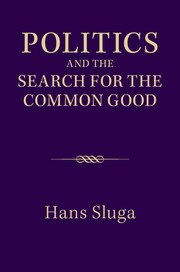Book contents
- Frontmatter
- Contents
- List of figures and tables
- Acknowledgments
- Introduction
- Part I The Search for the Common Good: Beyond the Normative and the Natural
- Part II Three Diagnostic Thinkers in Pursuit of the Common Good
- Chapter 5 Carl Schmitt: “all essential concepts are not normative but existential”
- Chapter 6 Hannah Arendt: “does politics still have a meaning?”
- Chapter 7 Michel Foucault: “could you define the sense you give the word ‘political’?”
- Part III The Fragility of the Common Good
- Bibliography
- Index
Chapter 5 - Carl Schmitt: “all essential concepts are not normative but existential”
Published online by Cambridge University Press: 05 November 2014
- Frontmatter
- Contents
- List of figures and tables
- Acknowledgments
- Introduction
- Part I The Search for the Common Good: Beyond the Normative and the Natural
- Part II Three Diagnostic Thinkers in Pursuit of the Common Good
- Chapter 5 Carl Schmitt: “all essential concepts are not normative but existential”
- Chapter 6 Hannah Arendt: “does politics still have a meaning?”
- Chapter 7 Michel Foucault: “could you define the sense you give the word ‘political’?”
- Part III The Fragility of the Common Good
- Bibliography
- Index
Summary
Carl Schmitt is a most controversial figure. Contention swirls, admittedly, around everyone who has ever reflected on politics. The disputatious character of politics spills regularly over into invective against the political philosopher. Think of Socrates, Plato, Machiavelli, Hobbes, Locke, Hegel, Marx, Nietzsche, and others. But Schmitt is more seriously controversial than most and that for both intellectual and biographical reasons. He is so for his uncompromising challenge to some of our most deep-seated political assumptions; he is even more so for his engagement with Hitler and the Nazi regime and his opportunistic anti-Semitism. One critic has, in consequence, dismissed his entire work as so deeply flawed that “no part of Schmitt’s own oeuvre is unproblematic – an isolation (or sanitization) of certain parts is impossible.”
There are reasons for disagreeing with that conclusion. Schmitt is such a multi-faceted figure that his thought cannot be said to be an indivisible whole. His oeuvre is anything but an organic totality from which no part can be isolated. Though he wrote voluminously on politics for more than fifty years, he never tried to condense his ideas into a single treatise. His best-known work, The Concept of the Political, is an essay of a mere 58 pages and its numerous revisions illustrate the permanent fluidity of Schmitt’s thinking. Schmitt wrote, in fact, invariably in response to the moment, not from a presumed “objective,” “detached or scientific” point of view. In all this he was closer to an aphorist like Nietzsche than to Hobbes whom he often invoked as an inspiration. I find it difficult, in any case, to believe in the unity of thought or the person. Our beliefs never form a totality in which the parts are organically and necessarily connected. What we call our system of belief is always only a field of dispersed convictions and concepts which we imagine to be held together by an unbreakable link. With Wittgenstein I want to say of my knowledge: “I have some evidence, but it does not go very far and is of a very scattered kind. I have heard, seen, and read various things.” The belief in the unity of the person is just as untenable – philosophically hallowed but nevertheless confused. Drawing once more on Wittgenstein, I am inclined to think that such a unity is impossible to reconcile with the multiplicity of our sensations, feelings, thoughts, intentions, expectations, etc.
- Type
- Chapter
- Information
- Politics and the Search for the Common Good , pp. 117 - 145Publisher: Cambridge University PressPrint publication year: 2014



